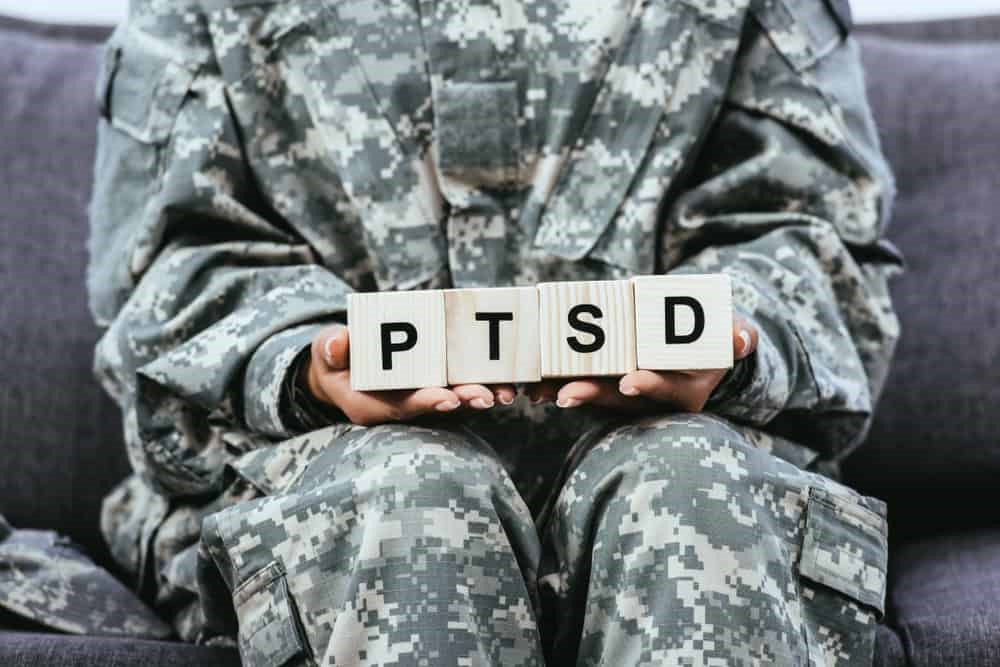Attention A T users. To access the menus on this page please perform the following steps.
1. Please switch auto forms mode to off.
2. Hit enter to expand a main menu option (Health, Benefits, etc).
3. To enter and activate the submenu links, hit the down arrow.
You will now be able to tab or arrow up or down through the submenu options to access/activate the submenu links.
Locator
Contact
Search
VA »
Health Care »
MIRECC / CoE
» VISN 6 MIRECC
»
VISN 6 > Education > Posttraumatic Stress Disorder (PTSD)
MIRECC / CoE
VISN 6 > Education > Posttraumatic Stress Disorder (PTSD)

Posttraumatic Stress Disorder (PTSD)
Posttraumatic stress disorder (PTSD) is a condition that can take place after a severe or prolonged trauma, such as those caused by war, accidents, and other traumatic life events (death, rape). PTSD victims may relive the traumatic episode(s) as triggered by violent memories (flashbacks) or nightmares. Clinical evidence suggests that that soldiers experiencing physical injury during deployment may have a higher prevalence of PTSD. It is common for PTSD victims to experience severe anxiety when exposed to scenarios reminiscent of the original trauma and have the tendency to avoid anything (mentally and physically) that reminds them of the traumatic experience. In addition, patients may manifest persistent alertness and mental hypersensitivity often experiencing insomnia, irritability, and low concentration. At times PTSD sufferers engage in risk-seeking activities such as drug abuse, unprotected sex, etc.Click here for more information about PTSD from the National Center for PTSD.
Learn about the latest updates from the PTSD National consultation program lecture series. Herein are some of the most recent documents and presentations:
PTSD Recovery Program: Treatment Manual (3rd ed)
The PTSD The Recovery Group was created for Veterans to learn a comprehensive understanding of Posttraumatic Stress Disorder, including symptomology, triggers, and behaviors that hinder recovery. Veterans will also be taught skills to effectively manage the emotional, social, physiological, and mental effects of PTSD without directly discussing the trauma that brought them to treatment.
The manual was developed with contributions from John Lynch, Ph.D., Laurin Mack, Ph.D., John Benesek, Psy.D. Christa Marshall, Psy.D. Lisa Clevinger, LCSW, Sue McHenry, LCSW, Sarah Reynolds, LCSW, Brian Mutchler, Psy.D. Brian Meyer, Ph.D., Dorothy Panissidi, LCSW., Andrew Jones, Ph.D. & Sandra Hall, LCSW. Revisions by Jennifer A Coleman, M.A., M.S.
Clinical Practice Guideline for PTSD 2023: Medication & Other Biological Treatments
By Paul Holtzheimer, MD
Recording (Adobe Connect)
Clinical Practice Guideline for PTSD 2023: Psychotherapy Recommendations
By Jessica Hamblen, PhD
Recording (Adobe Connect)
Rational Emotive Behavior Therapy (REBT)- Informed Group for PTSD
Clinical Resources: Facilitator's Guide; Patient's Workbook
In FY2008 a Special Committee on PTSD recognized the dilemma of increasing numbers of Veterans presenting with PTSD and co-morbid Mild Traumatic Brain Injury (mTBI) faced by VA clinicians and recommended a consensus conference be planned and convened. Click here for a full report.
Learn more about current Innovating Therapies for PTSD.



















